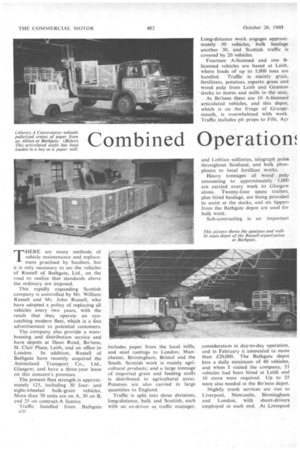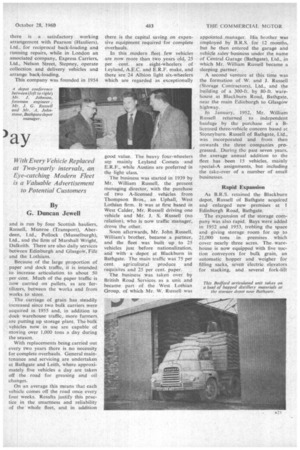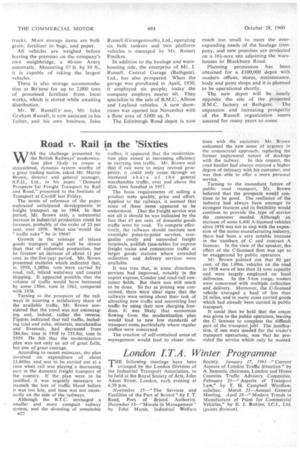Combined Operation!
Page 54

Page 55

Page 56

If you've noticed an error in this article please click here to report it so we can fix it.
manager.
) ay
With Every Vehicle Replaced at Two-yearly intervals, an Eye-catching Modern Fleet is a Valuable Advertisement to Potential Customers By G. Duncan Jewell
THERE are many methods of vehicle maintenance and replacement practised by hauliers, but it is only necessary to see the vehicles of Russell of Bathgate, Ltd., on the road to realize that standards above the ordinary are imposed.
This rapidly expanding Scottish company is controlled by Mr. William Russell and Mr. John Russell, who have adopted a policy of replacing all vehicles every two years, with the result that they operate an eyecatching modern fleet, which is a fine advertisement to potential customers.
The company also provide a warehousing and distribution service and have depots at Dean Road, Bo'ness, St. Clair Place, Leith, and an office in London. 'In addition, Russell of Bathgate have recently acquired the Anniesland Transport. Co., Ltd., Glasgow, and have a three-year lease on this concern's premises.
The present fleet strength is approximately 125,. including 30 fourand eight-wheeled bulk-grain vehicles. More than 70 units are on A, 30 on B,
and .25 on contract-A licence. . . Traffic handled from Bathgate u20
includes paper from the local mills, and steel castings to London, Manchester, Birmingham, Bristol and the South. Scottish work is mainly agricultural products, and a large tonnage of imported grain and feeding stuffs is distributed in agricultural areas. Potatoes are also carried in large quantities to England.
Traffic is split into three divisions, long-distance, bulk and Scottish, each with an ex-driver as traffic manager. Long-distance work engages approximately 50 vehicles, bulk haulage another 30, and Scottish traffic is covered by 20 vehicles.
Fourteen A-licensed and one Blicensed vehicles are based at Leith, where loads of up to 1,000 tons are handled. Traffic is mainly grain, fertilizers, potatoes. esparto grass and wood pulp from Leith and Granton 'docks to stores and mills in the area.
At Bo'ness there are 10 A-licensed articulated vehicles, and this depot, which is on the fringe of Grangemouth, is overwhelmed with work. Traffic includes pit props to Fife, Ayr and Lothian collieries, telegraph poles throughout Scotland, and bulk phosphates to local fertilizer works.
Heavy tonnages of wood pulp amounting to approximately 1,000 are carried every week to Glasgow alone. Twenty-four spare trailers, plus hired haulage, are being provided to assist at the docks, and six tippers from the Bathgate depot are used for bulk work.
Sub-contracting is an important consideration in day-to-day operation, and in February it amounted to more than £20,000. The Bathgate depot hire a daily minimum of 40 vehicles, and when I visited the company, 53 vehicles had been hired at Leith and 10 more were required. Up to 25 were also needed at the Bo'ness depot.
Nightly trunk services are run to Liverpool, Newcastle, Birmingham and London, with shunt-drivers employed at each end. At Liverpool there is a satisfactory working arrangement with Pearson (Hauliers), Ltd., for reciprocal back-loading and running repairs, while in London an associated company, Express Carriers, Ltd., Nelson Street, Stepney, operate collection and delivery vehicles and arrange back-loading.
This company was founded in 1954 and is run by four Scottish hauliers, Russell, Munroe (Transport), Aberdeen, Ltd., Pollock (Musselburgh), Ltd., and the firm of Marshall Wright, Dalkeith. There are also daily services between Edinburgh and Glasgow; Fife and the. Lothians.
. Because of the large proportion of paper and dock traffic, it is intended to. increase articulation to about 50 per cent. Much of the paper traffic is now carried on pallets, as are .fertilizers, between the works and from works to store..
The carriage of...grain has steadily increased since two bulk carriers were acquired in 1955 and, in addition to dock warehouse traffic,. more farmers are putting up storage plant.' Thebulk vehicles now j use are capable of moving over 1,000 tons a day during the season.
With replacements being carried out every two years there is no necessity for complete overhauls. General maintenance and servicing are undertaken at Bathgate and Leith, where approximately five vehicles a day are taken off the road for greasing and oil changes.
On an average this means that each vehicle comes off the road once every four weeks. Results justify this practice in the smartness and reliability of the whole fleet, and in addition there is the capital saving on expensive equipment required for complete overhauls.
In this modern fleet few vehicles are now more than two years old, 25 per cent. are eight-wheelers of Leyland, A.E.C. and E.R.F. make, and there are 24 Albion six-wheelers which are regarded as exceptionally good value. The heavy four-wheelers ar,12... mainly Leyland Comets and E.R.F., while Austins are preferred in the light class.
The business was started in 1939 by Mr. William Russell, the present managing director, with the purchase of two A-licensed vehicles from Thompson •Bros., an Uphall, West Lothian firm. It was at first based in West Calder, Mr. Russell driving one vehicle and Mr. J. S. Russell (no relation), who is now traffic manager, drove the other.
Soon afterwards, Mr. John Russell, William's brother, became a partner, arid the fleet was built up to 25 vehicles just before nationalization, and witty a depot at Blackburn in Bathgate. The main traffic was 75 per cent. agricultural produce and requisites and 25 per cent. paper.
The business was taken over by British Road Services as a unit and became part of the West Lothian Group, of which Mr. W. Russell was
appointed ,manager. His brother was employed by B.R.S. for 12 months, but he then entered the garage and vehicle sales' business under, the name ofCentral Garage (Bathgate), Ltd., in which Mr. William' Russell became a sleeping partner,
• A second venture at this time was the formation of W. and Russell (Storage Contractors), Ltd., and the building of a 300-ft. by 80-ft. warehouse at Blackburn Road, Bathgate, near the main Edinburgh to Glasgow
highway. • In January, 1952, Mr. William Russell returned to independent haulage by the purchase of a 'Blicensed three-vehicle threc-vehicle concern based at Stoneyburn. Russell of Bathgate, Ltd., was incorporated and from then onwards the three companies progressed. During the past seven years, the average annual addition to the fleet has been 15 vehicles, mainly Tecial-A assignments, but including the take-over of a number of small businesses.
Rapid Expansion
As B.R.S. retained the Blackburn depot, Russell of Bathgate acquired and enlarged new premises at 1 Edinburgh Road, Bathgate.
The expansion of the storage company was also rapid. Bays were added in 1952 and 1953, trebling the space and giving storage room for up to 21,000 tons in premises which cover nearly three acres. Thewarehouse is now equipped with five suction conveyors for bulk grain, an automatic hopper and weigher for filling sacks, seven -electric elevators for stacking, and several fork-lift
trucks. Main storage items are bulk grain, fertilizer in bags, and paper.
All vehicles are weighed before leaving the premises on the company's own weighbridge, a 40-ton Avery automatic. Measuring 37 ft. by 10 ft., it is capable of taking the largest vehicles.
There is also storage accommodation at DYTICSS for up to 2,000 tons of processed fertilizer from local works, which is stored while awaiting distribution.
Mr. W. Russell's. son, Mr. John Graham Russell, is now assistant to his father, and his own business, John
Russell (Grangemouth), Ltd., operating six bulk tankers and two platform vehicles is managed by Mr. Robert Foulkes.
In addition to the haulage and warehousing side, the enterprise of Mr. J. Russell, Central Garage (Bathgate), Ltd., has also prospered. When the garage was purchased in April, 1950, it employed six people; today the company employs nearer 60. . They specialize in the sale of B.M.C., Albion and Leyland vehicles. A new showroom was opened last November with a floor area of 5,000 sq. ft.
The Edinburgh Road depot is now much too small to meet the everexpanding needs of the haulage company, and new premises are projected on a 16+-acre site adjoining the warehouses in Blackburn Road.
Planning permission has been obtained for a £100,000 depot with modern offices, stores, maintenance, body and paint shops and it is planned to be operational shortly.
The new depot will be nearly opposite the site. of the projected B.M.C. factory at Bathgate. The expansion and increasing prosperity of the Russell organization seems assured for many years to come.




















































































































